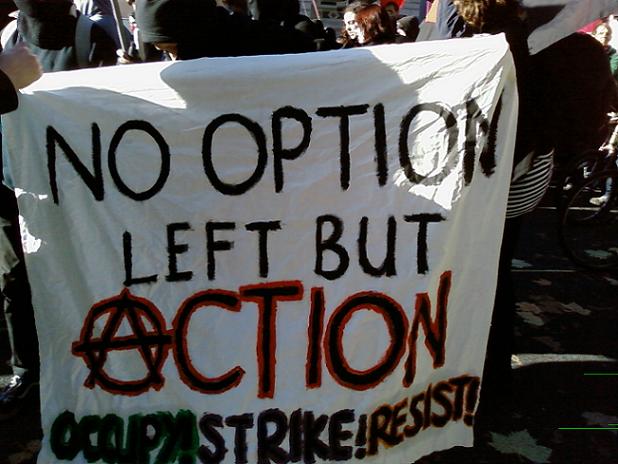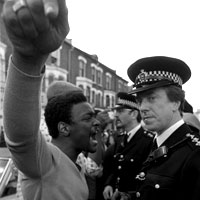The Anti-Imperialist Over-policed as citizens, under-policed as victims
New in Ceasefire, The Anti-Imperialist - Posted on Sunday, November 21, 2010 0:00 - 7 Comments
 By Adam Elliott-Cooper
By Adam Elliott-Cooper
In just under six months, the thirtieth anniversary of the Brixton riots will be upon us. Men and women, many now with families of their own, will look back at the suppression which agitated a generation to rise up, against unemployment, deprivation and the notorious ‘sus’ laws.
Thatcher’s government implemented this law so that a police officer could act on “suspicion”, or ‘sus’, alone. It was in effect used to stop and harass young Black men, as “suspicion” was translated into prejudice and discrimination. Uprisings across the country led to the repeal of the sus laws and the implementation of a Race Relations Act which made the state officially own up to its discriminatory practices.
This year is also the twentieth anniversary of the Poll Tax riots, which were not only a response to the unfair flat tax proposed by the Tories but also the mass unemployment and deprivation brought on by Thatcherism’s wave of reforms which privatised public industries and closed centres of industry across the country. This uprising saw an immediate repeal of the Poll Tax and, many argue, the beginning of the end for Margret Thatcher’s premiership.
However, this year, the coalition government are cutting public services in a manner not seen since the Great Depression. Furthermore, the government have also been planning to amend existing legislation in order to increase police powers, echoing the unaccountable racism that many hoped had become a thing of the past.
Coverage and analysis of the cuts themselves have been widespread. Less reported are the alternative sources of income that the British government is failing to pursue. Tax Research estimate that £120bn is owed to the tax service by big businesses which operate in the UK. Many corporations pay less (in percentage terms) in tax than working people. It has been widely publicised that the poor, women and particularly Black and Asian communities will be hit hardest by these cuts. With this in mind, one could argue that this is in fact a greater injustice than Thatcher’s universally despised poll tax.
Amid the media fanfare over the cuts, the coalition have made moves to sneak in a new type of ‘sus’. It is no secret that under the terror legislation, police no longer need reasonable suspicion to stop and search a person, resulting in black males being 26 times more likely to be stopped and searched than their White counterparts. The coalition government, in promising to restore civil liberties to British democracy, have instead proposed an amendment to police powers which is striking fear into Black and Asian communities all over the country.
The green paper ‘Policing in the 21st Century’ claims, “Over the years the amount of data central government has collected to assess the police has piled up to the extent that it is getting in the way of common sense policing”. The coalition therefore proposes to abolish mandatory receipts for stop and searches, the very receipts which allow researchers and activists to understand exactly how disproportionately African/Caribbean and Asian men are stopped and searched. The document does not expand on what it believes ‘common sense’ to be.
The second significant piece of reform, was so overtly discriminatory, that the government was recently forced to retreat on this amendment to the Public Order Act, which would have told officers that there “may be circumstances…where it is appropriate for officers to take account of an individual’s ethnic origin in selecting persons and vehicles to be stopped.”
Legislating ethnic profiling in this way gives police officers the green light from the government to adopt stereotypes and other assumptions they have about people from certain ethnic backgrounds when stopping them or their vehicle. Although evidence suggests that police already base many of their actions on racist stereotypes, when the law also supports this, it makes political resistance almost impossible.
 Anti-racist campaigners, journalists, lawyers and progressive policy-makers embarrassed the government into retracting these proposals. Nevertheless, the coalition’s attempt shows us that the government is willing to officially criminalise Black and Asian communities through explicitly racist legislation.
Anti-racist campaigners, journalists, lawyers and progressive policy-makers embarrassed the government into retracting these proposals. Nevertheless, the coalition’s attempt shows us that the government is willing to officially criminalise Black and Asian communities through explicitly racist legislation.
However, the lessons of the past have not been forgotten. We recently saw over 50,000 young people demonstrate against fees and cuts, employing civil disobedience and direct action in a manner not dissimilar to the youth uprisings of the 1980s. Trade unions and other groups are already talking about building activist networks with youth and student groups, creating a united front against the government.
The forthcoming legislation and the government’s signal to officers that they are fully supportive of racist policing is likely to anger many sections of society, particularly Blacks and Asians, who will no doubt be hit the hardest. If the planning, organising and militancy of previous decades returns in the coming months, big business, police and policy makers will be the targets of grassroots resistance, and will only have themselves to blame.
A national day of protests and direct action is planned for the 24th November, and it is up to us as activists to ensure that the coalition government doesn’t successfully resurrect the ghosts of Thatcher’s infamous past.
Adam Elliott-Cooper, a writer and activist, is Ceasefire Associate Editor. His column appears every other Sunday.
7 Comments
Joanna
Nikita
I appreciate how you tie in issues of class and race which are often apoliticized by the government and mainstream politics, but not forgotten by progressive activists from the past and present.
I look forward to reading your future pieces
James
Great piece, excellent analysis of that awful green paper
Fatima
Excellent. Great analysis and comparison of the present with the Thatcher era. A much needed reminder that things are getting worse and complacency is not an option.
Mik
Looking forward to the column.
There seem to be serious divides within the movement against the current government’s cuts that need to be overcome. I would very much like to see a strong anti-racist movement coming to the fore again, especially given the Tories’ racist policies, but unfortunately many white activists seem to see this movement as driven by identity politics and irrelevant to them.
I wondered whether people had any thoughts on how to break the monopoly of the (exclusively) class warriors that seem to be calling the shots at the moment.
adam
There are a number of anti-racist/anti-imperialist movements in Britain, fighting racist policing and British foreign policy respectively. The key I feel, is drawing the links between imperial foreign policy and the colonial-style policing of African and Asians in the UK.
The people and organisations are all there, and I feel a combination of cuts, foregin policy and dranconian policing may force alliances between these fractured movements.
amara
This article is very insightful and a reminder of the past which should never be forgotten.
As George Santayana once said: “Those who cannot remember the past are condemned to repeat it.” Hence, the coalition government must be reminded that any legislation passed, which discriminates against or impacts negatively on any ethnic minority group only provides a recipe for an uprising.


Interesting and informative – reminding us of past struggles and victories as we move forward to fight against the current injustices, cuts and racist legislation.